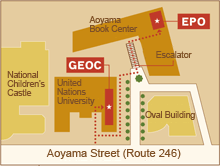DATE / TIME : 2020•11•10
On 18 February 2020, UNU-IAS, the Ministry of the Environment of Japan (MOEJ), and the Global Environment Outreach Centre (GEOC) co-organised the Symposium on “SDGs Localisation through Sports and 2020 Tokyo Olympic and Paralympic Host Towns”.
During the event, local governments heads and their representatives shared the importance of the role of sports in accelerating SDGs actions at local levels. The event highlighted specific actions on sports and sustainability implemented by the 2020 Tokyo Olympics and Paralympics Host Towns.
During the opening remarks, Tetsuya Nagashima(MOEJ) mentioned the possibility of addressing sports in a Regional Circular and Ecological Sphere (Regional-CES), a concept acknowledged in the Fifth Basic Environment Plan of the Government of Japan to promote the development of sustainable societies at local levels.
Kaoru Nemoto (Director, United Nations Information Centre (UNIC)), said Tokyo 2020 would be the first summer Games to address SDGs at the core concept and expressed her hope that the games would provide an opportunity to recognise the role of sports in achieving the SDGs.
Mie Kajikawa (Founder of Sport for Smile) delivered a keynote presentation on global trends on sports and sustainability. While there is a global trend for sports to implement sustainability initiatives such as ‘Sports for Climate Action’ by the United Nations Framework Convention on Climate Change (UNFCCC), she stressed a need for more collaborative actions among sports sectors to increase sustainability initiatives through sports across Japan.
In the next session, concrete examples of building sustainable communities through sports were presented by representatives from Shiga Prefecture, Ono City (in Fukui Prefecture), Aya Town (in Miyazaki Prefecture), and UNU-IAS Operating Unit Ishikawa / Kanazawa (OUIK). Akio Kanayama (Board Member for Sports of Shiga Prefecture) introduced an initiative to promote engagement between athletes and local residence by utilising local nature recourses, including Lake Biwa, the largest lake in Japan.
Shiho Ishiyama (Mayor of Ono City) presented on the city’s initiative on conserving the famous local spring water through various activities. Part of its activities is the annual charity run event which helps to raise funds for UNICEF’s water and sanitation activities in Timor Leste, while also raising awareness of environmental conservation among the participants.
Manabu Momita (Mayor of Aya Town) presented on the town’s ongoing community development theme of coexistence between nature and humans. As the town is designated as a UNESCO eco-park, the town is promoting organic farming, biodiversity protection, and forest conservation. The town is also hosting various sports camps, and it will be hosting athletes from the Republic of Seychelles for the Tokyo 2020 Olympic and Paralympic Games. He mentioned there are 2 UNESCO World Heritage Sites (Natural Sites) in the Republic of Seychelles and expressed his hope that the experience of the Tokyo 2020 host-town initiative will facilitate mutual learning on diverse nature and conservation efforts of both countries.
Mikiko Nagai (Manager, UNU-IAS OUIK) introduced SDGs localisation activities conducted in Kanazawa City together with local authorities, academia, and business. She mentioned that as a part of the host-town initiative, Kanazawa City would be hosting a swimming team from France and stressed the importance of bringing sports community and SDGs practitioners together for enhancing sustainable practice in sports.
In the discussion, panelists shared their views on ways to promote sustainable development at local levels through sports, continuing sustainable practices in sports even after the Tokyo 2020 Games, and creating a lasting sustainable legacy through the Tokyo 2020 host-town initiative.
https://ias.unu.edu/en/news/news/role-of-sports-in-accelerating-sdgs-actions-discussed-by-local-government-heads.html

















